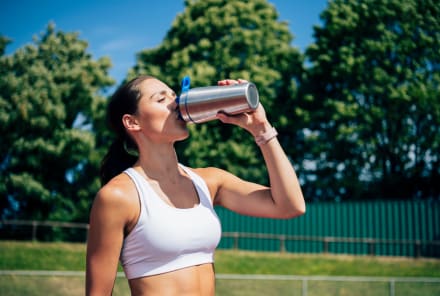Advertisement
Optimizing Levels Of This Nutrient Is The Ultimate Health Hack For Women

When we talk about iron levels, we tend to rely on some hard-and-fast facts: Iron deficiency is the most common and widespread nutritional deficiency in the world, according to the World Health Organization1. And one in five women of reproductive age in the United States has iron-deficiency anemia, per data by the National Institutes of Health. It's clear that iron deficiency is a big deal.
What we're not talking about as much? Many women have iron levels that don't technically qualify as deficient but are still low enough2 to prevent them from experiencing iron's full scope of health benefits. This is as important to know, especially because women need more than twice as much iron daily as men. (The general Recommended Daily Allowance3 for women is 18 mg and 27 g during pregnancy—for men, it's 8 mg.)
A few main reasons you might have lower iron levels:
- You're not eating enough iron-rich foods like eggs, meat, and leafy greens.
- You have a hard time absorbing iron even if your diet has plenty of it.
- Your body has a bigger demand for iron because you're menstruating, pregnant, an athlete, or a frequent blood donor.
- You live in a "food desert," where healthy, affordable food is not easily available.
3 big benefits of upping your iron levels — even if you're *not* deficient.
We all need iron4 for our bodies to make hemoglobin, the protein in red blood cells that carries oxygen from our lungs to the rest of our body. But this essential mineral doesn't have just one job: Iron also plays a vital role in keeping our immune system healthy, and experts will tell you that every cell in the body, from the muscles to the brain, needs iron to function3.
When you're low in iron, you may feel worn out all the time, feel a bit weak, or notice paler skin. The effects are pretty subtle—medical experts say that a person with iron deficiency anemia may not even experience any symptoms. But the gains of having optimal iron levels, on the other hand, can be game-changing.
If you want to feel less tired and more energized, sleep better, and strengthen nails and hair, optimizing your iron levels might be the health hack you're looking for. Read on for three of the big benefits:
- More energy, less exhaustion. Feeling an increase in energy is probably the most noticeable (and most common) benefit of maintaining optimal iron levels. For non-anemic women with low iron levels, iron supplementation has been shown to be effective in reducing unexplained fatigue, according to research studies. It's not a secret, either: One of the most well-known iron supplements is a plant-based liquid iron supplement called Ferritin+ —it has a 75-year history of helping women regain their energy and bounce back from feeling constantly exhausted.
- A boost in work productivity. Numerous studies have indicated that low iron levels are correlated with having low productivity5 and poor cognition and focus. In the same way that raising iron levels can eliminate feelings of drawn-out exhaustion and tiredness, increased productivity and concentration may be a major perk.
- Stronger muscles. Muscle weakness—loss in tone and elasticity—is often associated with low iron levels because muscles may not be getting enough oxygen to contract. Low iron levels are actually very common among female athletes6, particularly women in endurance sports. So, if you're running, swimming, or playing a sport regularly, this uptick in energy may benefit your athletic performance.

How to start bumping up your iron levels.
Since your body can’t produce iron on its own, make sure you're getting enough from your daily diet, or through supplementation. Keep in mind that animal sources of food, including meat and seafood, contain a type of iron that's more easily absorbable (known as heme iron), while the type found in plants like beans, nuts, vegetables, and fortified grains, is less bioavailable (non-heme iron). Plant-based iron sources of food need extra help getting absorbed, and eating vitamin-C-rich foods along with it is one way.
This is why the RDA for vegetarians is 1.8 times higher3 than for those who eat meat. Luckily, Ferritin+ has a unique low-dose formula with highly soluble iron gluconate, as well as co-factor B and C vitamins to help the body absorb it more easily.
Check out our list of 64 foods that are high in iron to help get you on track with a more iron-rich diet. Also, it goes without saying, but talk with your doctor to better understand what your optimal iron levels should be and come up with a game plan for your own health and lifestyle. Especially if you sense your levels might be low, bring it up. Lab tests like a ferritin test—which measures a blood protein that contains iron—can confirm if your body's iron stores are low.
These statements have not been evaluated by the Food and Drug Administration. This product is not intended to diagnose, treat, cure, or prevent any disease.
If you are pregnant, breastfeeding, or taking medications, consult with your doctor before starting a supplement routine. It is always optimal to consult with a health care provider when considering what supplements are right for you
6 Sources
- https://www.who.int/nutrition/topics/ida/en/
- https://www.ncbi.nlm.nih.gov/pmc/articles/PMC3685880/
- https://ods.od.nih.gov/factsheets/Iron-HealthProfessional/
- https://www.ncbi.nlm.nih.gov/pmc/articles/PMC3999603/
- https://www.ncbi.nlm.nih.gov/pubmed/11160598
- https://www.ncbi.nlm.nih.gov/pmc/articles/PMC4596414/

This Type Of Fat Is Vital For Women's Health — Are You Getting Enough?
Molly Knudsen, M.S., RDN

New Study Confirms The 3 Habits That Age Your Brain Faster
Molly Knudsen, M.S., RDN

This Type Of Fat Is Vital For Women's Health — Are You Getting Enough?
Molly Knudsen, M.S., RDN

New Study Confirms The 3 Habits That Age Your Brain Faster
Molly Knudsen, M.S., RDN














